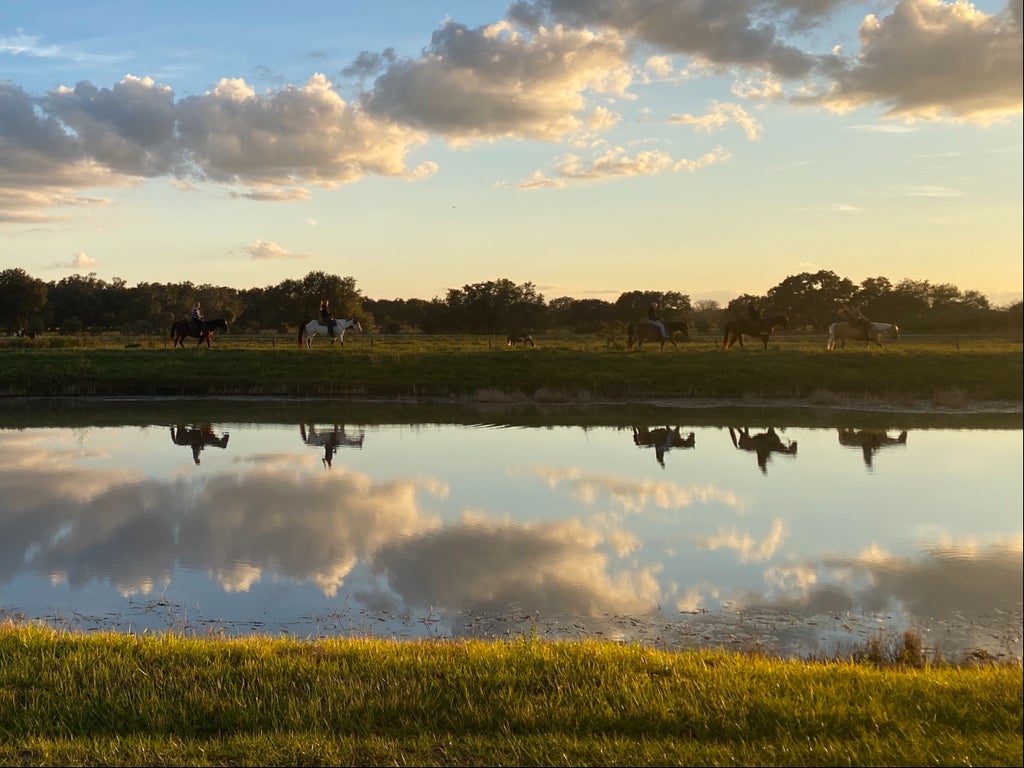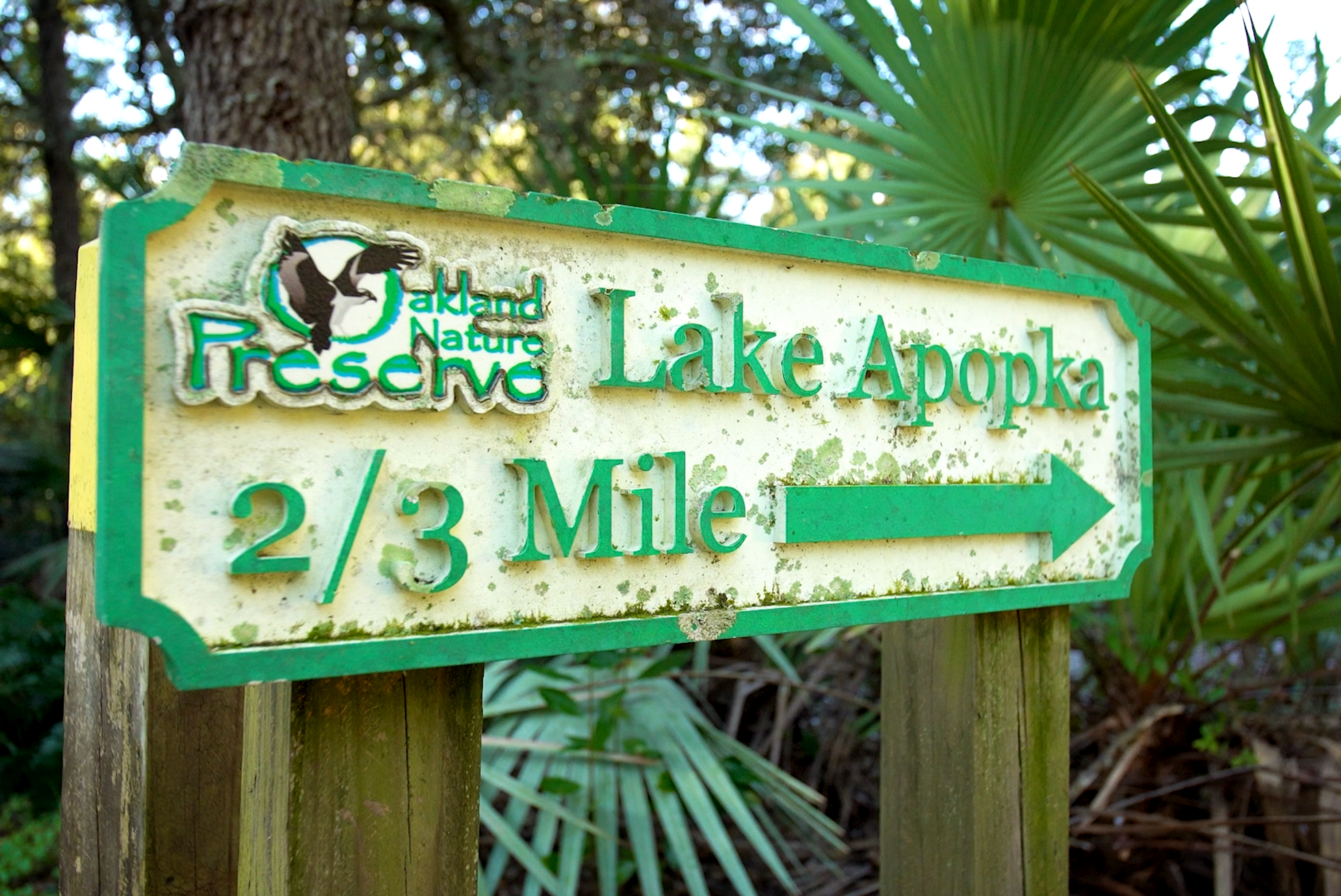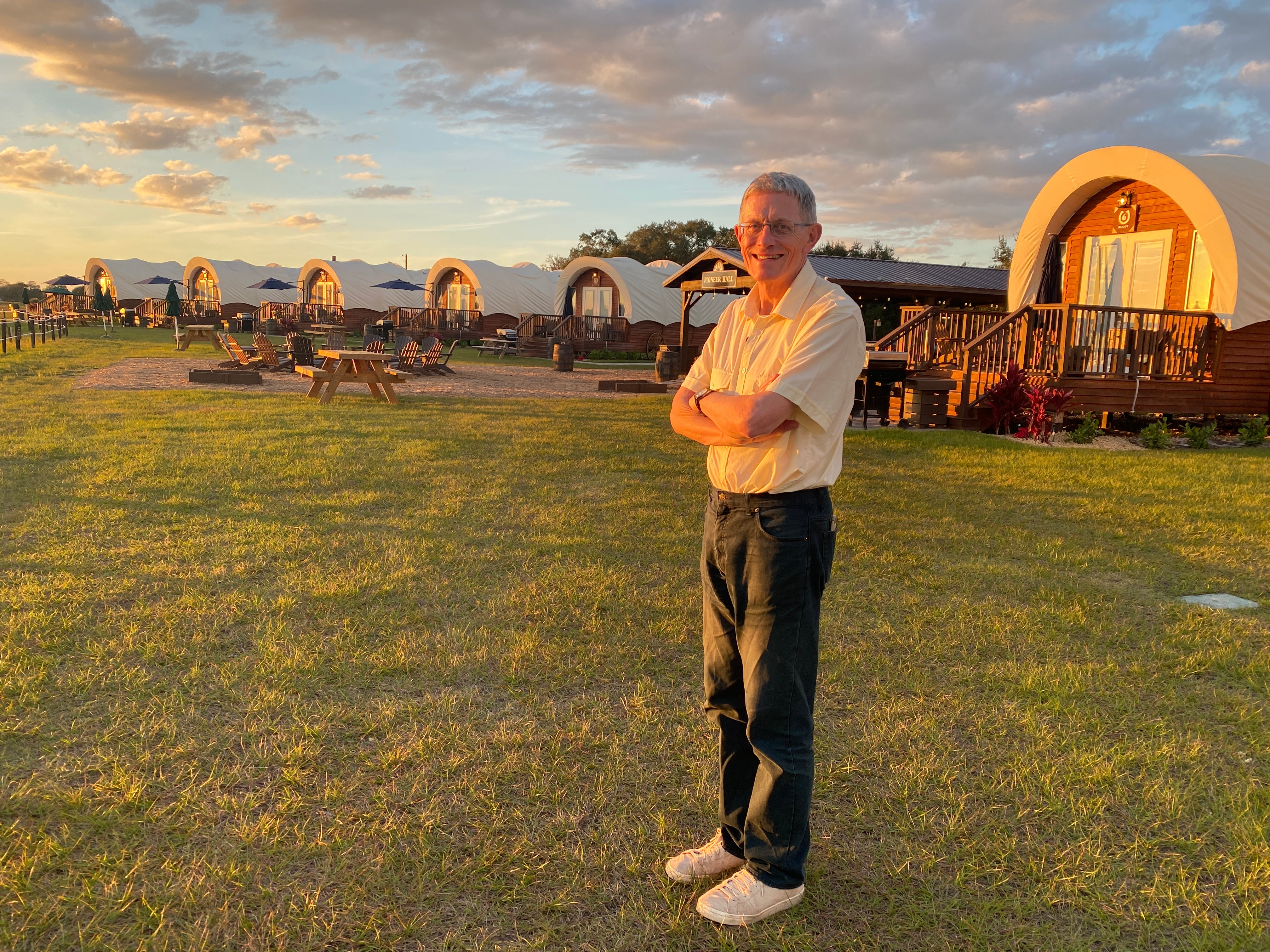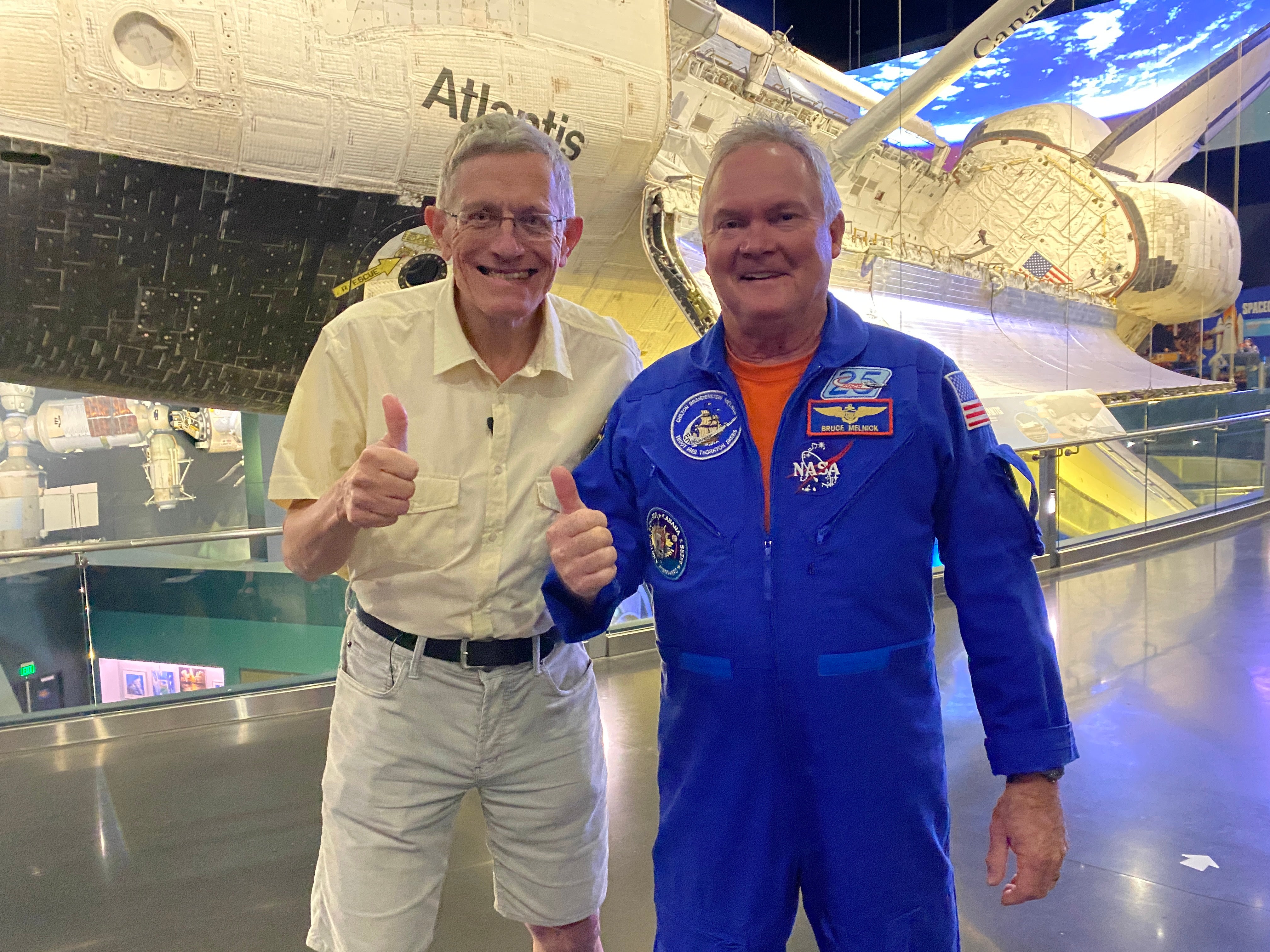
Orlando is magnetic: the city at the heart of the Florida peninsula attracts visitors from across America and the world. And the appeal keeps millions of travellers firmly within the realm of the theme-park capital.
Yet central Florida has far more to offer. In December, I explored the patchwork of lakes, ranches and shoreline that puts you in touch with mother nature and the cosmos.
I began on two wheels. Just 20 minutes from Orlando’s International Drive along Florida’s Turnpike takes you to the start of the West Orange Trail at Killarney Station – where the Bikes and Blades depot can kit you out with a bicycle for the 22-mile track. Almost all of it follows an old railroad line, which means you can breeze along at a fair speed, safely segregated from traffic as you wind through some fascinating hidden backwaters.
Switch to two feet for the Healthy West Orange Boardwalk, which leads to the shore of Lake Apopka. At first sight this looks like ancient wilderness at its most accessible and alluring – but what you see is the result of heroic efforts by concerned citizens to restore the original ecology.

A few miles further on you reach the lovely town of Winter Garden. Two highlights: Plant Street Market, which includes a coffee roastery and a microbrewery; and the old railroad station building. In its heyday, Winter Garden was the largest citrus shipping point in the United States along the Tavares and Gulf Railroad.
The path is part of America’s Rail Trail Network: a web of paths created from former railroad tracks. This particular line connected the citrus fruit plantations – still an important part of the fabric of Florida.
Just 30 miles south, you can pick your own fruit from the orchards at a family-run farm, Ridge Island Groves, then see the work that goes on behind the scenes at the packing house.
A further 20 miles takes you to a very special location on the mid-Florida Ridge. While this 150-mile long sand ridge is not quite a rival for the Alps or Himalayas, it stands out from the rest of the Florida peninsula. One of its highest points is Iron Mountain, almost 300 feet above the Gulf and Atlantic shores. Today, it is the location for one of central Florida’s most spectacular sights: Bok Tower. This is the creation of Edward W Bok, a Dutch immigrant.
When Edward was a young lad, his grandmother advised him: “Make the world a bit better or more beautiful because you’ve lived in it.” He did both, creating a gorgeous garden with a thousand varieties of plant and adding a dramatic marble edifice that soars heavenward for a further 205 feet.
You may hear the tower almost as soon as you see it, thanks to the dozens of bells cast in the English town of Loughborough and installed in the tower as a carillon. On many days, Bok Tower’s own award-winning musician, Geert De Hollander, gives live carillon concerts.
While the views from Iron Mountain are inspiring, I wanted to get closer to the natural world – which you can do while skimming across the marshy headwaters of the Florida Everglades, with superb vistas of water, land and sky.
Take an airboat ride, in a vessel powered by giant fans mounted on the stern rather than propellor. That design means they can glide through the most tangled reeds, taking you to within smiling distance of stubborn, thick-skinned survivors from a distant age who have somehow endured into the 21st century: Florida’s original residents, the alligators.
Parts of the landscape began to change with European arrivals to Florida. Spanish settlers created America’s original cowboy country. Five centuries on, their legacy is commemorated at the Westgate River Ranch Resort & Rodeo. Check into a wagon or teepee for the night, and discover your inner cowboy or cowgirl. Camping is rarely so glamorous, and as part of the deal you get your breakfast delivered to your tent in the morning.

As far as I can calculate, nowhere in Florida is more than 60 miles from the coast of either the Atlantic Ocean or the Gulf of Mexico, and the sea is always enticing. Cocoa Beach is an excellent location. This laid-back surf town has retro touches such as a splendid pier that celebrates its 60th birthday in 2022.
You can learn to surf, as the Atlantic swells are usually pitched just right for beginners to catch that first wave. And you can enjoy the fruits of the sea, for example at Q’s Crackin Crab & Seafood Kitchen – where the creator, Quinisia Bredwood, promises soulful seafood, made with love.
My favourite place to stay on the coast is a short way north at Casa Coquina. This friendly B&B has imaginative decor, an idiosyncratic sculpture garden – and a deck for great views of rocket launches. Because this is the Space Coast, the planet’s main connection with the Cosmos. But before a launch, I like to take one of my favourite great American drives: a seven-mile trip along a one-way street.
Black Point Wildlife Drive on Merritt Island snakes along a series of dykes, originally created to help with mosquito control. Today, it provides a wildlife viewing experience that attracts ornithologists and photographers from across the nation to see birdlife such as the roseate spoonbill.
In the early 1960s after President Kennedy came up with the then-preposterous notion that he wanted an American on the moon by the end of the decade. Nasa took over Merritt Island as an excellent location, on the edge of America and handily close to the Tropics.
Even six decades ago, though, there was concern for the environment. The naturalist Allan Cruickshank campaigned for much of the isle to be retained in its natural state as a national wildlife reserve refuge.
A “memorial trail” has been named in his honour: a five-mile circular hiking loop.
You can find a vast array of wintering waterfowl, and manatees in the springtime, plus a pervading sense of tranquility. Until, of course, you are reminded that this island is shared with the Cape Canaveral space launch site.
Between July 1969 and December 1972, the Apollo programme made walking on the Moon seem as routine as walking into Walmart. While Houston was the home for Nasa mission control, the business end was handled at Cape Canaveral: sending astronauts from the Atlantic to the Sea of Tranquility. And in the 21st century, this eastward projection into the ocean has never been busier.
Whether or not a space launch is scheduled, at any time of the year a visit to the Kennedy Space Center will remain in your memory banks. This attraction is both a museum of cosmological adventures and source of inspiration for the future of exploration.
You may also be fortunate enough to meet an astronaut: one of the very select group of just 600 people who have been into space. I was greeted by Bruce Melnick beside Atlantis – in a building that was constructed around the last of the shuttles to return from space.

Bruce took part in two Space Shuttle missions, including the maiden voyage of Endeavour in 1992. “There’s a big bang when the eight explosive bolts let go, and off you go, rocketing into space,” he says.
“It looks like a slow ascent when you take off, but we’re already going at 100mph when we clear the top of the tower. It’s a real kick in the pants.
“What’s really cool is: you outrun the speed of sound very quickly, so all that noise goes away pretty quick.”
Atlantis ended her final mission in 2011, after three decades of the Space Shuttle being the workhorse of Nasa – keeping America connected with the cosmos. Now, it’s the turn of the next generation.
Close to sundown, I wandered along to Kennedy Point Park, listening to the water lapping and watching the optimistic anglers. But that evening there was more company than usual – as locals and tourists gathered to watch a rocket launch beyond the earth’s fragile atmosphere.
The show I watched was courtesy of Elon Musk’s SpaceX company – transporting 53 Starlink satellites into orbit.
The moment of lift off was strangely silent. Across the water I saw flames erupt and engulf the rocket – before the roar swept across the water and engulfed me.
The precious communications spacebar equipment has taken up residence in the skies – but the Kennedy Space Center is going beyond. The next attraction, due to open in spring 2022, is called “Gateway: The Deep Space Launch Complex”. Explore intra-Florida, then go interstellar.







